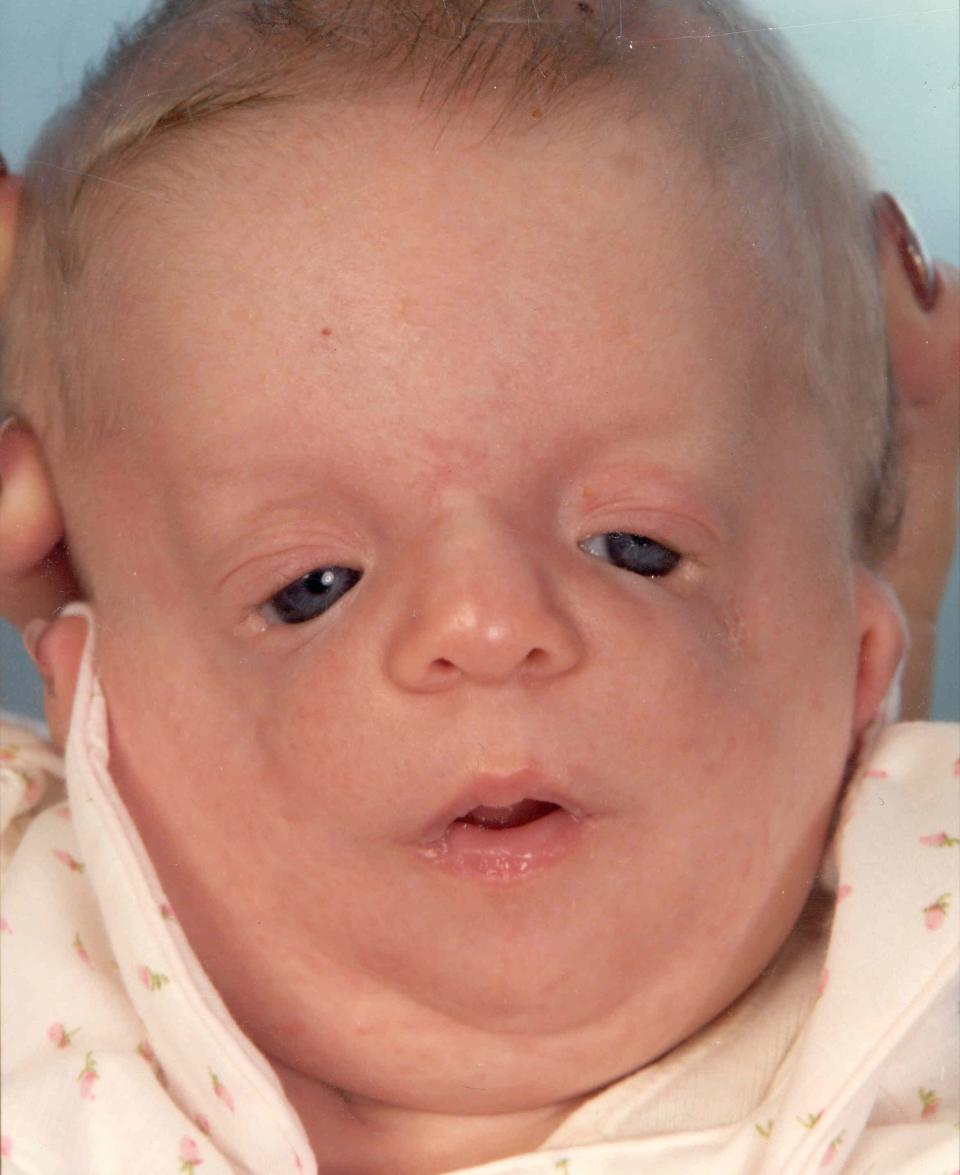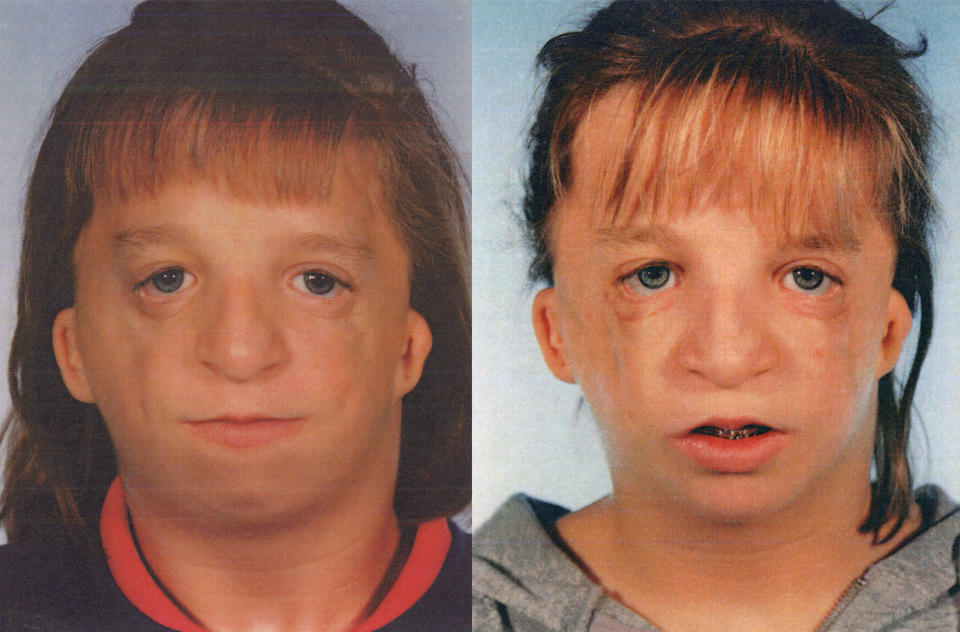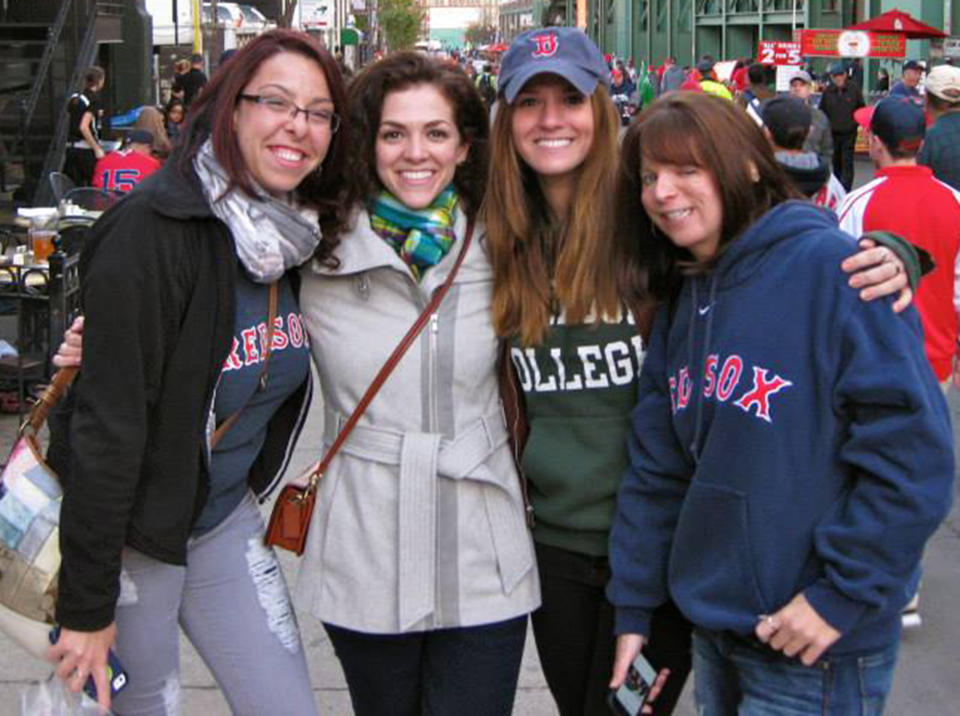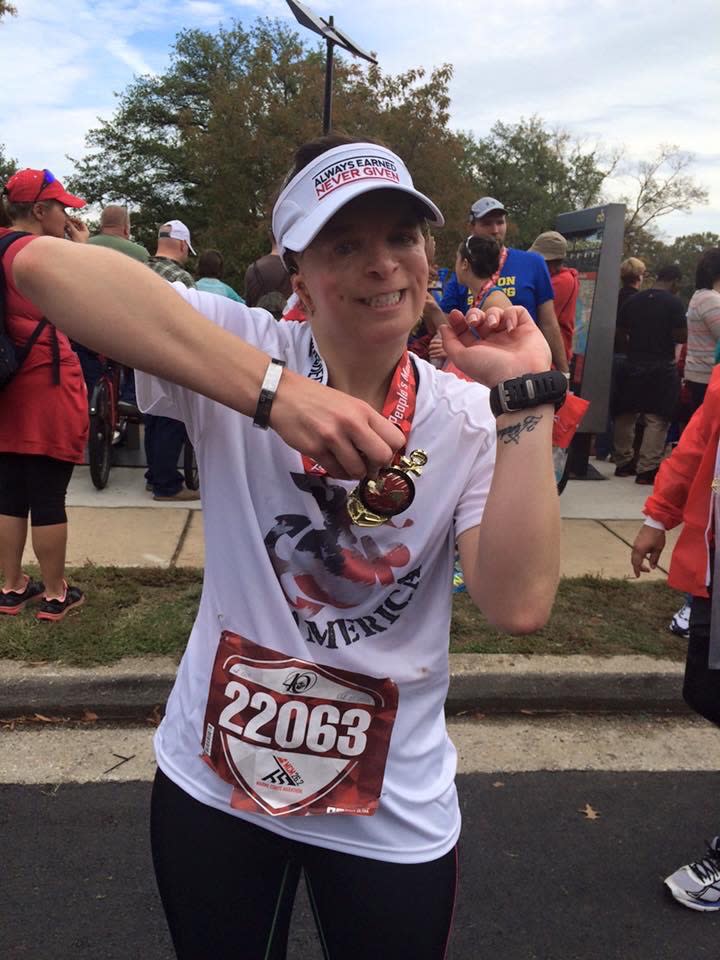What It's Like to Live With Treacher Collins


Kristin Bartzokis, 34, was born with Treacher Collins syndrome, a condition that affects the development of bones in the face and other facial tissues. The underdevelopment can subsequently lead to hearing, breathing, and swallowing issues as well for the 1 in every 50,000 people affected.
Bartzokis, theauthor of the recently released Diary of a Beautiful Disaster, opened up about living with a facial deformity in a world that's so obsessed with image and how Treacher Collins has affected her in ways beyond what you can see.
Was there a particular moment you realized you were different?
Growing up, my parents never treated me any differently. They never let on that I had a condition. I think the moment I actually noticed I looked different was, I was 4 years old, I was sitting in front of the mirror and putting on my mom's makeup, and I noticed the shape of my eyes were different than hers. That's when it hit me and she explained to me then, in the best way she could explain to a 4-year-old, that I did have something wrong with me.
When describing your journey, you say you came from a “disastrous beginning.” What does that mean?
In 1982 [when I was born] no one really knew of or spoke about facial anomalies. The day I was born, the doctor and the nurses were very standoffish - they kind of ignored my parents, [who I learned a lot of the stories of my early childhood from while writing the book]. Eventually, they showed me to my mom, and my parents noticed something seemed a little odd and that I had little ears. But I was their first child so they really didn't know what to expect. You know, when babies come out, they just assumed everything was swollen and that's what it was and that I was fine.
My mom worked in radiation therapy at a hospital, actually, and one of her radiologist friends knew of a doctor who fixed cleft palates - I did have a cleft palette [when I was born]. So my parents took me to this specialist in Miami who took one look at me and goes, “Oh, she has something way worse [than just a cleft palate].” They eventually met with a reconstructive surgeon who told my parents I had Treacher Collins. So when I say “disastrous,” it was the unknown part. It took forever to find out what I had. It's not like today where you can just Google different symptoms and come up with an answer or reach out to support groups. My parents were on their own and it was a struggle for months.

What surgeries have you had, elective or otherwise?
I first had cleft palate surgery when I was 18 months old. That was necessary because I couldn’t get food down.
What came next?
I had surgeries when I was 3, 5 and 7, during which they took bone from my skull and put it in my cheeks - they needed to build up the bone that was missing [there] and every time you add bone, eventually some of it gets absorbed into the body.
I didn't have surgery again until I was 14 and that one was massive - they actually broke my upper and lower jaw and shifted my bones forward to open up my airway and allow me to breathe better; I’d been having trouble breathing for a while. They also took cartilage from my hip and put it in my chin area, and then also took more bone from my skull and put it in my cheeks. That was huge. I was on a soft food diet for months.
Was that the last surgery?
When I was 16, I actually had this device put in my lower jaw. Every day, you had to turn these two little screws to cause the jaw to slowly lengthen it and bring forward my chin. You do that until [you couldn't screw them anymore]. It was super painful and I was on a liquid diet for months [again] because I had my mouth wired shut.
I had a few more surgeries [in my 20s], still building up the cheeks and the chin, but more so with either rib cartilage or soft tissue [and] fat injections because at that point, there was no need to put any more bone.

Would you say every surgery from 16 onward was elective?
Mostly. I did have one done to my lower eyelids, which really wasn't elective - essentially they tried to raise up my lower eyelids more. With Treacher Collins, because there is no bone there originally to support the eye socket, the lower eyelids droop, and when this happens, your eyes actually get really, really dry, and if you don't do something to correct that, you can actually get ulcers and eventually go blind. So that was necessary.
Tell me what it’s like to be a middle schooler going through massive facial reconstruction surgeries.
When I was 14, and they told me I needed more surgery, I actually broke down in the office, because I had gone seven years without stepping foot in a hospital. But I'd say the surgery when I was 16 was probably the most impactful because it happened during the school year. I missed [about two months of] school, and then I had to go back with a contraption in my mouth, and so I definitely felt awkward. I went to a pretty small Catholic private school, so the kids there were great, but I just felt like I was a robot. It happened when I was 16 and, you know, everyone else was dating and I had metal sticking out of me.

It’s interesting your classmates were great about your situation - you’d think teens wouldn’t be.
If I went to a school baseball or softball game, I noticed kids from other schools gawking at me. I got stared at all the time. I mean, I still do. Especially when I had the metal, people looked at me even more. My mom would take me out to the mall on the first big day out of the hospital [to get me out of the house], and I'd still be really swollen and really red, and with my face, already it obviously looked like something happened to me. I would have strangers come up to me and be like, “Oh, you look like you’re hurt. Are you OK?” It's like, “Just leave me alone.”
But I went from kindergarten to eighth grade with the same kids, so they just knew me, and I was a competitive gymnast, so I was very muscular. They knew I could kick their butt. So I think they just thought of me as Kristin and a gymnast, not as the girl with the weird face.
Do you find adults to actually be less respectful than kids?
Yes, I've always felt like this. Kids are innocent. They don't know anything! So when they stare at me, if they've never been taught anything, [it's because] they're curious. I look different to them. I totally understand. So I usually smile at them and let them look because I know it's kind of fascinating.
The slightly older ones, say, middle schoolers - that's the toughest age and they’re the nastiest people. I actually feel like I'm noticing it more now than I did when I was a kid. For example, I was in a supermarket one day recently, just going about my business, and I saw these two boys, probably 12, literally pointing and laughing at me. I should've said something but I just walked away. Later on, I was like, “Man, I should've talked to their mom who was standing right there because they are not even trying to hide their pointing and laughing.” I don't think I look that different [but] I wear a hearing aid that's totally noticeable, and I have little ears, which is what they were laughing at.
Adults are usually ... fine. But I have had people come up to me and just ask, “So, were you burned in a fire?”
I have had people come up to me and just ask, 'So, were you burned in a fire?'
People just ask you that?
Yup. I’m like, “No?” I mean, that’s what you’re going to start the conversation with? Or I had some woman come up to me once when I was just eating at the mall food court when I was younger, and she just stared straight at me, said, “Jesus loves you,” and walked away. So adults are usually more respectful, but sometimes they’re not.

Do you prefer people ask you questions about your appearance? Or would you rather they not?
Oh, yes, absolutely! If I can educate, I will definitely do it.
Is there a time someone asked you questions that stood out as particularly respectful?
When I was in high school, I was on my competitive cheerleading team, and there was one girl who was fairly new. We didn’t really know each other but we sat next to each other on the bus going up to one of our competitions. And she goes, “So … can I ask you a question?” Most of the time, that’s how it starts ... and I know exactly what it’s going to be. But she actually asked, point-blank, “Do you have Treacher Collins syndrome?” That was the first time anyone has ever asked me that question. And I was like, “Oh my god, you know what it is!” We spent the better part of three hours on the bus talking about it. And it was one of the best conversations I have ever had [about Treacher Collins]. I was so shocked because normally it’s “What’s wrong with your face?”
Do you ever have moments where you’re like, “I am so sick of talking about my face, I never want to think about my syndrome ever again”?
Oh god, yeah. I know everyone has those up and down moments, but there are times where I’m like, “I’m so over this. I just want to look like everybody else. I don’t want to stand out, I just want to be able to walk through the mall or do my grocery shopping and just kind of blend in.”
What impacts you most on an emotional level now that didn’t when you were a teenager?
What I really think has had the most impact on me is the realization that I'm 34 years old and I've never had a boyfriend. I've never been on a date. I've never done any of that. And part of it, a lot of it, is just me inside of my own head. That definitely comes from everything I've been through, especially as a teenager who didn't start dating when everyone else did.
Have you tried to date before?
I have not. That is one of my goals for this year, but I’ve been so busy. I signed up for the dating sites and I think I’ve just been too afraid because it’s one of those “OK, do I say that I have something wrong with me? Do I say specifically what is wrong with me, or…” kind of things. Because I don’t introduce myself in person and say, “Hi, I’m Kristin. I have Treacher Collins syndrome.” Is that what I should do?
But at the same time, if I don’t do that, and then I do meet someone like face-to-face [without specifying I have Treacher Collins], will they think I lied to them? I guess I just don’t make an effort to find single guys.

Where do you feel most comfortable?
At the gym. I was a gymnast, and gymnastics is the thing that first taught me how to be confident and to believe in myself. Any time I do something athletic, I feel like I’m in my element. I run marathons, I lift weights, and my body is the thing that has told me that I am equal to everyone else.
Something I'm especially proud of is when I was in gymnastics, I think it was in 1992, I was the first person in the state of Florida to receive a perfect 10 in the level-four state competition. It’s an amazing feat and not only did I get a perfect 10, I showed myself that with all of my imperfections I can be perfect, and I am perfect.

Follow Tess on Twitter.
Related Video:
For more news videos visit Yahoo View, available now on iOS and Android.
You Might Also Like

